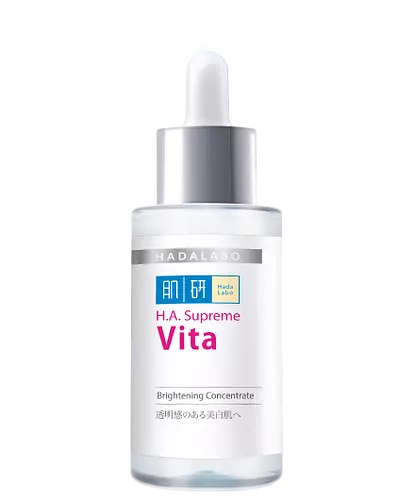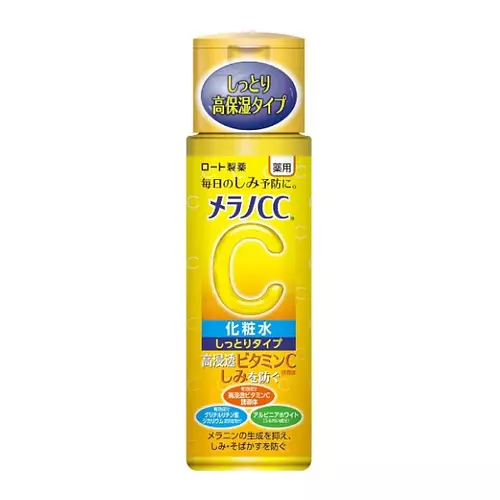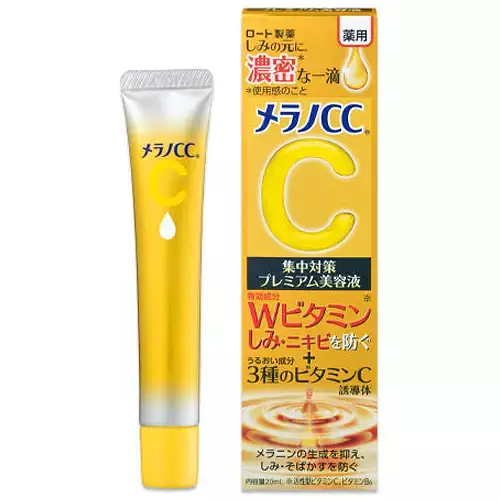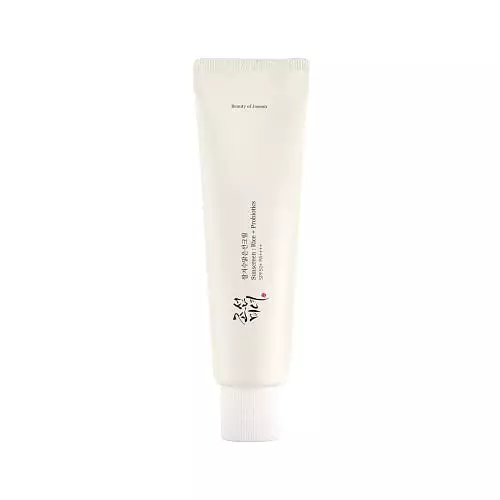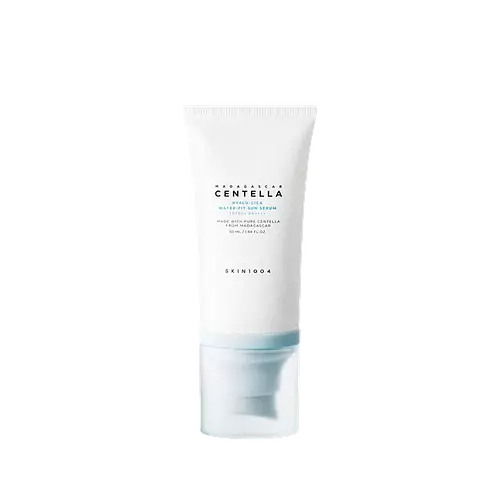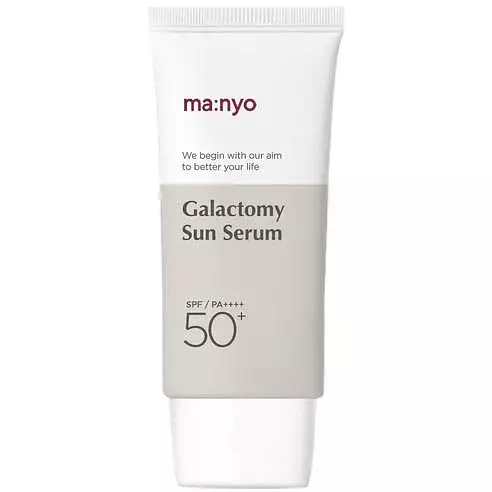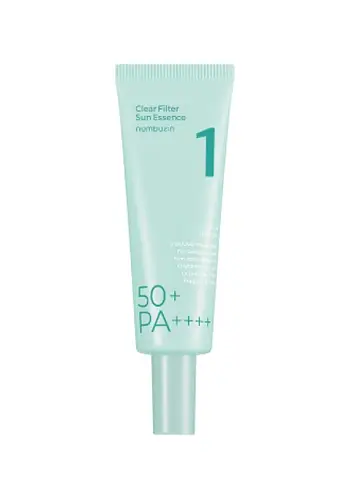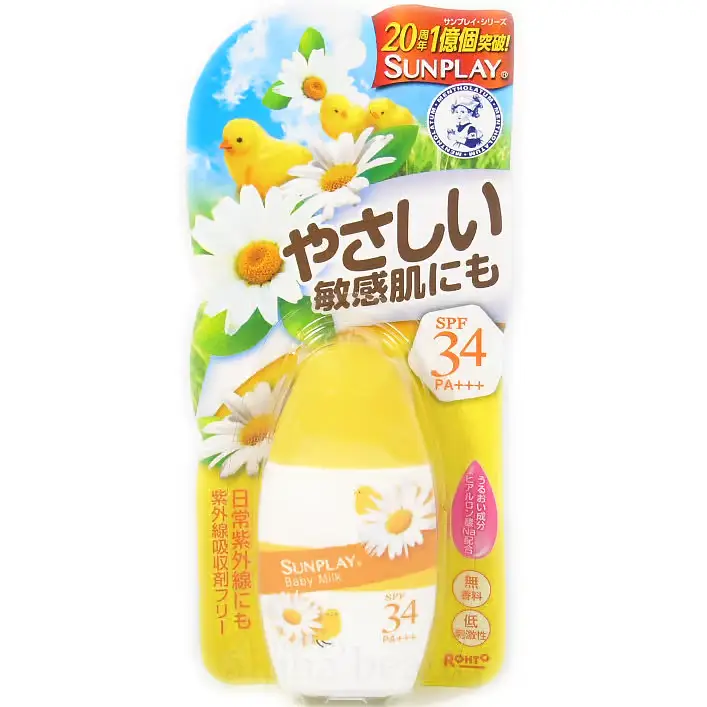
Rohto Mentholatum SunPlay Baby Milk SPF34 PA +++ Ingredients Explained
Published June 25, 2022 • Added by ThomaSkinCare
Overview
What it is
Sunscreen with 20 ingredients that contains exfoliants, hyaluronic acid, SPF, Vitamin C and Vitamin E
Cool Features
It is fungal acne (malassezia) safe
Suited For
It has ingredients that are good for fighting acne, anti aging, dry skin, brightening skin, scar healing, dark spots and better texture
Free From
It doesn't contain any harsh alcohols, common allergens, fragrances, oils, parabens or sulfates
Fun facts
Rohto Mentholatum is from Japan. This product is used in 10 routines created by our community.
We independently verify ingredients and our claims are backed by peer-reviewed research. Does this product need an update? Let us know.
Sunscreen with 20 ingredients that contains exfoliants, hyaluronic acid, SPF, Vitamin C and Vitamin E
Quick info
You should know
Notable Ingredients
This product contains 2 ingredients that may have this attribute:
This product contains 1 ingredient that may have this attribute:
This product contains 1 ingredient that may have this attribute:
This product contains 1 ingredient that may have this attribute:
This product contains 1 ingredient that may have this attribute:
Benefits
This product contains 1 ingredient that may have this attribute:
This product contains 1 ingredient that may have this attribute:
This product contains 2 ingredients that may have this attribute:
This product contains 2 ingredients that may have this attribute:
This product contains 1 ingredient that may have this attribute:
This product contains 2 ingredients that may have this attribute:
This product contains 1 ingredient that may have this attribute:
This product contains 4 ingredients that may have this attribute:
Concerns
This product contains 1 ingredient that may have this attribute:
Ingredients 20
Cyclopentasiloxane is a silicone used to improve texture and trap moisture. An easier name for this is D5.
Water. It's the most common cosmetic ingredient of all. You'll usually see it at the top of ingredient lists, meaning that it makes up the largest part of the product.
Dimethicone is a silicone used for making products smooth and silky. It also has the added benefit of sealing in hydration. The amount of dimethicone found in beauty products is considered safe and non-comedogenic, meaning it won't clog pores.
Zinc Oxide is a mineral broad-spectrum UV filter; it is the broadest UVA and UVB reflector approved by the FDA. While it is most commonly man-made for cosmetics, it can naturally occur in zincite, a rare mineral.
Glycerin is already naturally found in your skin. It helps moisturize and protect your skin.
Titanium dioxide is known for its UVA and UVB protection properties. It is non-comedogenic and non-irritating. Titanium Dioxide is a physical sunscreen. Physical sunscreens reflect light and prevent it from reaching your skin.
Polymethylsilsesquioxane is a silicone used as a film forming agent.
This silicone is an emollient. Emollients create a thin film on the skin to prevent moisture from escaping.
1,2-Hexanediol is a multi-tasker ingredient. It acts as a preservative to increase shelf-life and can aid other preservatives in preventing microbe growth. 1,2-Hexanediol also helps the skin retain moisture as a humectant.
Hyaluronic acid is naturally found in healthy skin. It is a humectant, meaning it draws moisture to your skin.
Sodium Ascorbyl Phosphate is a form of Vitamin C. It is the salt of ascorbic acid.
Tocopheryl Acetate is AKA Vitamin E. It is an antioxidant and protects your skin from free radicals. Free radicals damage the skin by breaking down collagen.
Hydrated Silica is a type of silicon dioxide. It is called 'hydrated silica' because it is silica with extra bonded water atoms.
Polyglyceryl-3 Polydimethylsiloxyethyl Dimethicone is a type of silicone.
Aluminum Hydroxide is a form of aluminum. It can be naturally found in nature as the mineral gibbsite. In cosmetics, Aluminum Hydroxide is used as a colorant, pH adjuster, and absorbent.
Panthenol is a common ingredient that helps hydrate and soothe the skin. It can be found naturally in our skin and hair.
Cyclopentasiloxane, Water, Dimethicone, Zinc Oxide, Glycerin, Ppg-10 Methyl Glucose Ether, Titanium Dioxide, Polymethylsilsesquioxane, Trimethylsiloxysilicate, 1,2-Hexanediol, PCA Dimethicone, Hyaluronic Acid, Glycyrrhizic Acid, Sodium Ascorbyl Phosphate, Tocopheryl Acetate, Hydrated Silica, Polyglyceryl-3 Polydimethylsiloxyethyl Dimethicone, Hydrogen Dimethicone, Aluminum Hydroxide, Panthenol
Ingredient Ratings
Based on the number of likes and dislikes each ingredient has received.
Ingredients Explained
Cyclopentasiloxane is a silicone used to improve texture and trap moisture. An easier name for this is D5.
D5 is considered lightweight and volatile. Volatile means it evaporates quickly after application. Once evaporated, D5 leaves a thin barrier that helps keep skin hydrated.
D5 is an emollient. Emollients help soften the skin and prevent water loss. Silicones create a silky texture in products. D5 helps other ingredients become more spreadable.
Studies show D5 is safe to use in skincare products. We recommend speaking with a skincare professional if you have concerns.
Learn more about CyclopentasiloxaneWater. It's the most common cosmetic ingredient of all. You'll usually see it at the top of ingredient lists, meaning that it makes up the largest part of the product.
So why is it so popular? Water most often acts as a solvent - this means that it helps dissolve other ingredients into the formulation.
You'll also recognize water as that liquid we all need to stay alive. If you see this, drink a glass of water. Stay hydrated!
Learn more about WaterDimethicone is a silicone used for making products smooth and silky. It also has the added benefit of sealing in hydration. The amount of dimethicone found in beauty products is considered safe and non-comedogenic, meaning it won't clog pores.
Dimethicone has been found increase absorption in skin, boosting the benefits of other ingredients. While there is concern for the safety of dimethicone, the levels used in skincare are safe for use.
Zinc Oxide is a mineral broad-spectrum UV filter; it is the broadest UVA and UVB reflector approved by the FDA. While it is most commonly man-made for cosmetics, it can naturally occur in zincite, a rare mineral.
Today, traditional and nano-sized zinc oxide can be found in beauty products. Nano-sized zinc oxide can enhance a product's UV protection. While it is not believed to have a negative effect on skin, nano-zinc oxide can be harmful to coral reefs.
More about harmful reef ingredients here.
Zinc Oxide also has antibacterial and calming properties. It is not water soluble.
Zinc has been used throughout history as an ingredient in paint and medicine. An Indian text from 500BC is believed to list zinc oxide as a salve for open wound. The Ancient Greek physician Dioscorides has also mentioned the use of zinc as an ointment in 1AD.
Learn more about Zinc OxideGlycerin is already naturally found in your skin. It helps moisturize and protect your skin.
A study from 2016 found glycerin to be more effective as a humectant than AHAs and hyaluronic acid.
As a humectant, it helps the skin stay hydrated by pulling moisture to your skin. The low molecular weight of glycerin allows it to pull moisture into the deeper layers of your skin.
Hydrated skin improves your skin barrier; Your skin barrier helps protect against irritants and bacteria.
Glycerin has also been found to have antimicrobial and antiviral properties. Due to these properties, glycerin is often used in wound and burn treatments.
In cosmetics, glycerin is usually derived from plants such as soybean or palm. However, it can also be sourced from animals, such as tallow or animal fat.
This ingredient is organic, colorless, odorless, and non-toxic.
Glycerin is the name for this ingredient in American English. British English uses Glycerol/Glycerine.
Learn more about GlycerinWe don't have a description for Ppg-10 Methyl Glucose Ether.
Titanium dioxide is known for its UVA and UVB protection properties. It is non-comedogenic and non-irritating. Titanium Dioxide is a physical sunscreen. Physical sunscreens reflect light and prevent it from reaching your skin.
Protecting your skin against UV radiation can prevent the signs of aging. Sun damage is associated with fine-lines, wrinkles, loss of firmness, and hyperpigmentation. Titanium dioxide can help prevent premature aging.
With modern production, nano-scale or fine-grade titanium dioxide can be easily produced for cosmetics. In sunscreen, titanium dioxide absorbs UV light. Our skin is not able to absorb Titanium dioxide, even nanoparticles.
Titanium itself is the 9th most common element in the Earth's crust. Titanium dioxide is formed when oxygen is introduced and can be found in ores, dust, sand, and soil.
Pure titanium dioxide is a white powder that is used in many products to add or change color.
Learn more about Titanium DioxidePolymethylsilsesquioxane is a silicone used as a film forming agent.
When applied to the skin, this ingredient creates an invisible film on the surface. This film still allows oxygen to pass through, but prevents moisture from escaping. This can help condition and hydrate the skin. It also leaves a silky feel when applied.
Polymethylsilsesquioxane has not been shown to clog pores. It has been deemed safe to use up to 55%, but most cosmetics use much less.
If you have concerns about using this ingredient, we recommend speaking with a professional.
Learn more about PolymethylsilsesquioxaneThis silicone is an emollient. Emollients create a thin film on the skin to prevent moisture from escaping.
It is not soluble in water and helps increase water-resistance in products.
According to a manufacturer, it can blend seamlessly with silicone oils, such as Cyclopentasiloxane.
Learn more about Trimethylsiloxysilicate1,2-Hexanediol is a multi-tasker ingredient. It acts as a preservative to increase shelf-life and can aid other preservatives in preventing microbe growth. 1,2-Hexanediol also helps the skin retain moisture as a humectant.
In products that are water-based, this ingredient can help stabilize perfumes and fragrances. It can also help make the texture of products softer and more smooth.
PCA Dimethicone is a type of silicone.
Hyaluronic acid is naturally found in healthy skin. It is a humectant, meaning it draws moisture to your skin.
This ingredient helps hydrate, soothe, and protect the skin.
What makes hyaluronic acid so hydrating? It has the capacity to bind or hold large amounts of water.
Fun fact: It is already naturally found in our bodies, such as the fluids of our eyes and our joints.
Studies find this ingredient to have anti-inflammatory and anti-microbial properties. This can help speed up wound-healing,
These are some other common types of Hyaluronic Acid:
Learn more about Hyaluronic AcidWe don't have a description for Glycyrrhizic Acid.
Sodium Ascorbyl Phosphate is a form of Vitamin C. It is the salt of ascorbic acid.
This ingredient is more gentle than ascorbic acid. It is also more stable when exposed to light and oxygen.
Vitamin C helps reduce redness, improve skin texture, reduce the effects of aging, reduce the visibility of dark spots, and brighten skin.
Your skin uses Vitamin C to produce collagen and collagen production plays a role in having a strong skin barrier and plump skin. As an antioxidant, this ingredient also helps reduce the signs of aging such as fine-lines and wrinkles.
VItamin C helps brighten skin by blocking the process of skin darkening.
In a 2011 study, Sodium Ascorbyl Phosphate was found to have antibacterial properties. This may help treat acne.
Read more about other types of Vitamin C:
Learn more about Sodium Ascorbyl PhosphateTocopheryl Acetate is AKA Vitamin E. It is an antioxidant and protects your skin from free radicals. Free radicals damage the skin by breaking down collagen.
One study found using Tocopheryl Acetate with Vitamin C decreased the number of sunburned cells.
Tocopheryl Acetate is commonly found in both skincare and dietary supplements.
Learn more about Tocopheryl AcetateHydrated Silica is a type of silicon dioxide. It is called 'hydrated silica' because it is silica with extra bonded water atoms.
It is an absorbent and abrasive, meaning it is exfoliating.
Silica is often used for absorption and can help reduce shine when products are applied.
Learn more about Hydrated SilicaPolyglyceryl-3 Polydimethylsiloxyethyl Dimethicone is a type of silicone.
Hydrogen Dimethicone is a type of silicone.
Aluminum Hydroxide is a form of aluminum. It can be naturally found in nature as the mineral gibbsite. In cosmetics, Aluminum Hydroxide is used as a colorant, pH adjuster, and absorbent.
As a colorant, Aluminum Hydroxide may add opacity, or reduce the transparency. Aluminum hydroxide is contains both basic and acidic properties.
According to manufacturers, this ingredient is an emollient and humectant. This means it helps hydrate the skin.
In medicine, this ingredient is used to help relieve heartburn and help heal ulcers.
Learn more about Aluminum HydroxidePanthenol is a common ingredient that helps hydrate and soothe the skin. It can be found naturally in our skin and hair.
This ingredient is also referred to as pro-vitamin B5 or dexpanthenol in dermatology.
Panthenol is famous due to its ability to go deeper into the skin's layers. Using this ingredient has numerous pros (and no cons):
Like hyaluronic acid, panthenol is a humectant. Humectants are able to bind and hold large amounts of water to keep skin hydrated.
Once oxidized, panthenol converts to pantothenic acid. Panthothenic acid is found in all living cells.
Learn more about PanthenolCompared With
Here are some products that it's often compared with
More Rohto Mentholatum Products
See all Rohto Mentholatum productsMore Sunscreens
See all sunscreensWe're dedicated to providing you with the most up-to-date and science-backed ingredient info out there.
The data we've presented on this page has been verified by a member of the SkinSort Team.
Read more about us
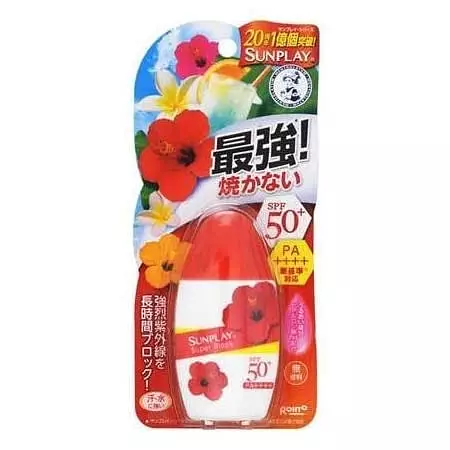

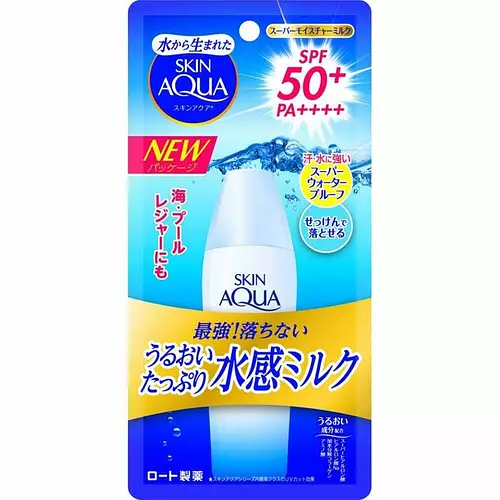
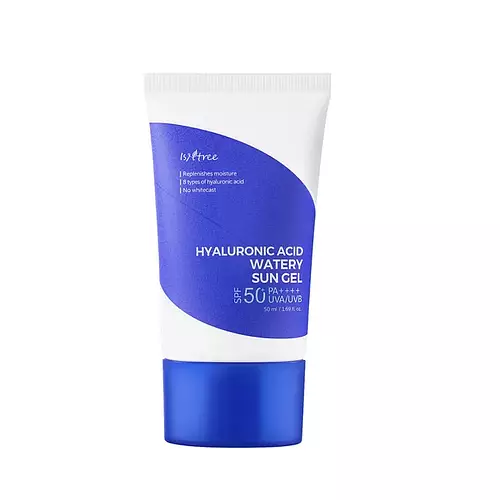
.png)
